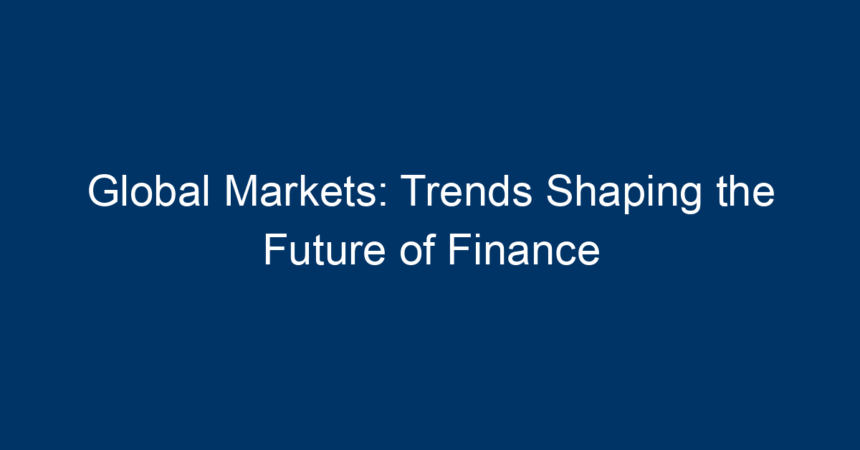The landscape of global markets is in constant flux, influenced by technological advancements, geopolitical shifts, and evolving consumer behavior. As we delve into the trends shaping the future of finance, it’s vital to recognize how interconnected our world has become, where local events can resonate on a global scale. This article explores key trends driving changes in global markets, providing actionable insights for investors, businesses, and consumers alike.
Understanding Global Markets
Global markets refer to the interconnected financial systems where national economies engage in the exchange of goods, services, currencies, and securities. The rise of globalization has led to a more integrated trading environment, where investors can participate in a broader range of investment opportunities. Understanding these markets requires awareness of the various factors at play, including economic indicators, geopolitical events, and technological transformations.
The Digital Transformation
1. Blockchain and Cryptocurrencies
One of the most significant trends impacting global markets is the rise of blockchain technology and cryptocurrencies. Decentralized finance (DeFi) platforms are revolutionizing transactions, allowing users to engage in financial activities without traditional intermediaries. As cryptocurrencies like Bitcoin and Ethereum gain traction, they are influencing investment strategies and payment systems globally.
Implications for Investors:
- Diversifying portfolios to include cryptocurrencies can be a prudent strategy, but it’s essential to stay informed about regulatory developments.
- Embracing secure blockchain technology may enhance transparency and efficiency in financial operations.
2. FinTech Innovations
Financial Technology (FinTech) is reshaping how consumers access financial services. From mobile banking apps to peer-to-peer lending, FinTech solutions are democratizing finance, allowing small businesses and individuals to gain easier access to capital.
Implications for Businesses:
- Companies that leverage FinTech solutions can reduce operational costs and improve customer engagement.
- Traditional financial institutions must innovate to stay competitive, or risk losing market share to agile FinTech startups.
Geopolitical Influences
1. Trade Wars and Tariffs
Trade wars, particularly between major economies, can create ripples in global markets. Tariffs imposed on imports can lead to increased prices, affecting consumer behavior and business operations. The U.S.-China trade confrontation illustrates how geopolitical tensions can influence international trade flows and investment decisions.
Actionable Insights for Global Investors:
- Keep a close eye on trade negotiations and tariff announcements to anticipate market movements.
- Consider diversifying investments into regions less affected by geopolitical strife to mitigate risks.
2. Regulatory Changes
Changing regulations can pose both opportunities and challenges for investors. With varying legislation across different regions, staying informed about regulatory shifts is crucial for making informed investment decisions.
Best Practices for Staying Compliant:
- Subscribe to financial news sources and regulatory updates to remain compliant.
- Engage with local experts and consultants to navigate complex regulatory environments.
The Rise of ESG Investing
1. Sustainable Finance
Environmental, Social, and Governance (ESG) investing is gaining momentum as consumers and investors increasingly prioritize sustainability. This trend is not merely a fad; research indicates that companies with robust ESG practices tend to outperform their peers.
Why ESG Matters:
- Investors are now seeking to align their portfolios with their values, making ESG considerations essential.
- Companies that prioritize sustainability often experience improved brand reputation and customer loyalty.
For Institutional Investors:
- Incorporating ESG factors into investment strategies can enhance risk management and potentially lead to better long-term returns.
The Impact of Technology on Consumer Behavior
1. The Rise of eCommerce
The growth of eCommerce has had profound effects on global markets. Businesses are increasingly adopting online sales platforms to reach a broader audience. This shift has changed consumer expectations, driving demand for convenience and rapid delivery times.
Implications for Businesses:
- Companies must invest in technology and logistics to meet changing consumer preferences.
- Understanding consumer data analytics will allow businesses to tailor their offerings more effectively.
2. The Power of Social Media
Social media is playing a pivotal role in shaping market trends. The rise of influencer marketing has changed how brands interact with customers. Platforms like Instagram and TikTok are becoming essential channels for product discovery and brand loyalty.
Actionable Strategies for Brands:
- Leverage social media for targeted marketing campaigns to engage younger demographics.
- Monitor online sentiment to adapt marketing strategies swiftly in response to consumer feedback.
Global Economic Recovery Post-Pandemic
The COVID-19 pandemic has accelerated changes in global markets, highlighting the importance of resilience and adaptability. As economies recover, businesses are recalibrating their strategies to address new consumer behaviors.
1. Remote Work and Its Implications
The shift to remote work is here to stay, transforming traditional business models. Organizations are redefining workplace norms, leading to increased productivity and employee satisfaction.
What Businesses Can Do:
- Implement robust remote work policies and invest in necessary technology.
- Foster a strong company culture that supports remote teams to enhance collaboration and engagement.
2. Health and Safety Innovations
Investments in health and safety innovations are not only essential for navigating the ongoing pandemic but also create new market opportunities. Companies focusing on health tech and safety solutions are likely to thrive in the coming years.
Investment Opportunities:
- Consider sectors that focus on health tech, telemedicine, and safety products.
- Explore startups innovating in health solutions as potential high-growth investment avenues.
Conclusion: Preparing for the Future of Global Markets
The trends shaping global markets are diverse and multifaceted, creating both opportunities and challenges. By understanding these trends, businesses and investors can position themselves strategically for future growth. The key takeaways include:
- Embrace Technology: Stay updated on emerging technologies like blockchain and FinTech to harness their benefits.
- Stay Informed: Keep abreast of geopolitical changes and regulatory shifts that can impact investments.
- Adopt ESG Principles: Integrate ESG factors into investment decisions to align with a growing focus on sustainability.
- Leverage Data: Utilize consumer data analytics to inform marketing strategies and product offerings.
- Foster Flexibility: Develop adaptable business models that can quickly respond to market changes.
In navigating the complexities of global markets, these actionable insights can empower you to make informed decisions, ensuring a successful financial future in an ever-evolving landscape. As we move forward, those who are proactive, adaptable, and informed will thrive in the intricate world of global finance.




